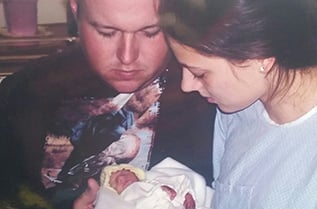STRC Deletion/Duplication MLPA is a molecular test used to detect copy number variants in the gene associated with STRC-related disorders including type 16 autosomal recessive deafness.
Test Finders
STRC-Related Disorders: STRC Sequencing
STRC sequencing is a molecular test used to identify variants in the gene associated with STRC-related disorders including type 16 autosomal recessive deafness.
Fragile X Syndrome: FMR1 Methylation Analysis
Additional characterizations of FMR1 expansions for methylation status following abnormal PCR detection of abnormal allele.
Trisomy 18 FISH, Rule Out Mosaic (Buccal)
Trisomy 18 FISH, Rule Out Mosaic is a cytogenetic test designed to detect varying degrees of mosaicism for chromosome 18 aneuploidy.
Trisomy 13 FISH, Rule Out Mosaic (Buccal)
Trisomy 13 FISH, Rule Out Mosaic is a cytogenetic test designed to detect varying degrees of mosaicism for chromosome 13 aneuploidy.
Trisomy 21 FISH, Rule Out Mosaic (Buccal)
Trisomy 21 FISH, Rule Out Mosaic is a cytogenetic test designed to detect varying degrees of mosaicism for chromosome 21 aneuploidy.
Trisomy FISH Screen (13,18,21,X,Y) (Chorionic Villus Sampling (CVS))
Trisomy Screen FISH analysis is a cytogenetic test used to identify aneuplodies involving chromosomes 13, 18, 21, X, and Y.
Chromosome Analysis, Routine; Short Study (Solid Tissue/POC)
Short study chromosome analysis includes routine karyotyping using G-banding, but fewer cells are analyzed than with routine karyotyping. For short study chromosome analysis, a minimum of 5 cells are counted and a minimum of 2 cells are analyzed for chromosomal abnormalities. Short study chromosome analysis can be used to complement other methods such as microarray to detect certain rearrangements that can only be identified by karyotype. A karyotype can detect chromosome abnormalities such as trisomy, monosomy, triploidy, and marker chromosomes as well as balanced and unbalanced rearrangements.
Chromosome Analysis, Routine (Solid Tissue/POC)
Chromosome analysis is an important component in the diagnosis and evaluation of genetic disorders. Chromosome abnormalities in which there is too much or too little genetic material can result in congenital malformations, intellectual disability, and aberrant sexual differentiation. Chromosome analysis can detect chromosome abnormalities such as trisomy, monosomy, triploidy, and marker chromosomes as well as balanced and unbalanced rearrangements. For routine chromosome analysis a minimum of 20 cells are counted to determine the modal number, and a minimum of 5 cells are analyzed for chromosomal abnormalities from G-banded preparations.
Chromosome Analysis, Routine; Short Study (Chorionic Villus Sampling (CVS))
Short study chromosome analysis includes routine karyotyping using G-banding, but fewer cells are analyzed than with routine karyotyping. For short study chromosome analysis, a minimum of 5 cells are counted and a minimum of 2 cells are analyzed for chromosomal abnormalities. Short study chromosome analysis can be used to complement other methods such as microarray to detect certain rearrangements that can only be identified by karyotype. A karyotype can detect chromosome abnormalities such as trisomy, monosomy, triploidy, and marker chromosomes as well as balanced and unbalanced rearrangements.


